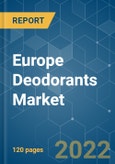During the COVID-19 pandemic, the deodorant industry experienced a decline in demand due to travel limitations. The supply chain was also severely impacted. Due to the offline distribution channels’ storing tendency and consumers stepping out only for necessary things, the demand for deodorants declined as they were not recognized as essential items. However, with the easing of travel restrictions, consumer demand for deodorants increased dramatically.
With increasingly hectic lifestyles, Europeans are looking for convenient solutions that allow them to save time and make their life easier. This trend is favoring deodorant sprays and roll-ons, which are easier to apply and more time-saving than other deodorant types.
Moreover, the popularity of the different deodorant formats varies from country to country in Europe. Deodorant sprays remain the most popular product format among European consumers. However, the category has lost popularity as consumers seek “cleaner” ingredient lists, such as aluminum and alcohol-free. For instance, sprays are less popular in Scandinavian markets, where consumers prefer roll-ons.
Key Market Trends
Inclination Toward Transparency and More Natural Ingredients in the Deodorants Market
Sales of deodorants with a natural positioning are expected to grow over the forecast period, in line with the rising demand for natural beauty and personal care products in the European market. More consumers believe that frequently using deodorants and antiperspirants containing aggressive chemicals, such as aluminum-based compounds and parabens, can be a health risk. Consumers are also expected to appreciate formulations that are free from alcohol, fragrance, and parabens and contain natural ingredients like aloe vera, cucumber, eucalyptus, and tea tree oil. Consumers also prefer skin moisturizing, stain-free properties, and antibacterial properties.
Dove offers a 0% Aluminium Original Roll-on Deodorant in its product portfolio. It also contains ¼ moisturizing cream and 0% alcohol. These types of products are expected to boost the market during the forecast period.
Increasing Expenditure on Advertisement, Promotion, and Innovations
R&D and advertisement are driving the growth of the market. Key players are investing in these factors to influence consumer purchase decisions. The rising influence of social media and celebrity endorsement impacts the advertisement strategies adopted by key market players. Companies are focusing on innovating according to consumer preferences to increase their market share in the European deodorants market. For instance, TexPro launched a whole range of 100% organic, unscented products that prevent sweating and are suitable for people with allergies. The flagship product is a deodorant used on clothing instead of the skin, which seems to be a solution for some consumers.
Competitive Landscape
The European deodorants market is competitive, and the major strategies adopted by the key players include product innovations, partnerships, expansions, and mergers and acquisitions.
The major players covered in the European deodorants market report are Church & Dwight Co. Inc., Colgate-Palmolive Company, Coty Inc., L’Oréal International, REVLON, Estée Lauder Inc., Procter & Gamble, Henkel AG & Co. KGaA, Beiersdorf AG, and Unilever.
Unilever launched the Degree, the world's first deodorant designed for people with disabilities, in partnership with the Muscular Dystrophy Association, a non-profit organization, Open Style Lab, and The Lighthouse Chicago.
Additional Benefits:
- The market estimate (ME) sheet in Excel format
- 3 months of analyst support
This product will be delivered within 2 business days.
Table of Contents
Companies Mentioned (Partial List)
A selection of companies mentioned in this report includes, but is not limited to:
- Unilever
- Coty Inc.
- Beiersdorf AG
- Church & Dwight Co. Inc.
- Colgate-Palmolive Company (Sanex)
- Procter & Gamble Co.
- Estée Lauder Inc.
- Henkel AG & Co. KGaA
- New Avon Company
- Kao Corporation








